Sign Up for Newsletter
Craving something sweet after a workout? Instead of reaching for dessert, consider swapping in a healthy, natural alternative: tea. For centuries, teas have been used not just for their pleasant taste but for their impressive health benefits. These five teas—Mint, Chamomile, Ginger, Hibiscus, and Rooibos—are not only great for satisfying your sweet tooth but also offer powerful health perks that can improve your overall wellness, support fitness goals, and aid in recovery.
A Brief History of Tea and Health
Teas have been a cornerstone of health practices across cultures for millennia. Originally consumed for medicinal purposes, teas were highly valued in ancient China, India, and Egypt. Over time, the health benefits of tea became well-known worldwide, and various types were found to have specific properties that aided digestion, reduced inflammation, and improved mental clarity. Today, tea has become a staple in many fitness and wellness routines, particularly because it provides a natural and sustainable way to enhance health without excessive calories or sugars.
As a fitness enthusiast, you’re always looking for ways to optimize your nutrition and support your training. Each of these teas has unique properties that can support both your mental and physical goals. Let’s dive into how these teas can be the sweet, healthy addition to your day.
Mint Tea: A Fresh Boost for Your Digestive System
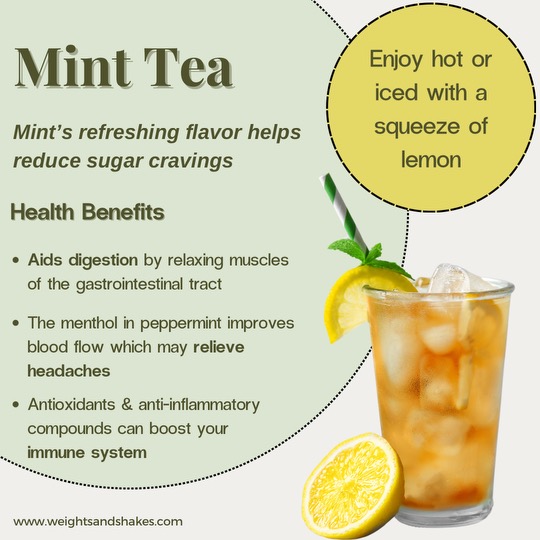 If you’re feeling bloated or sluggish after a heavy meal or workout, mint tea can be a refreshing way to get your digestive system back on track. Known for its soothing properties, mint has been used for centuries to calm digestive issues, reduce headaches, and clear sinuses.
If you’re feeling bloated or sluggish after a heavy meal or workout, mint tea can be a refreshing way to get your digestive system back on track. Known for its soothing properties, mint has been used for centuries to calm digestive issues, reduce headaches, and clear sinuses.
How does it impact training? Mint tea can be an excellent post-workout drink because it calms the stomach and promotes digestion, allowing your body to absorb nutrients more effectively. Its cooling nature can also soothe muscles after intense physical exertion, making it a smart choice for athletes and fitness lovers.
Studies have also suggested that the menthol in mint can help improve respiratory function, which could be beneficial for endurance training and cardio-heavy workouts.
Grab a pack here: Twinings Pure Peppermint.
Chamomile Tea: The Secret to Better Sleep and Relaxation
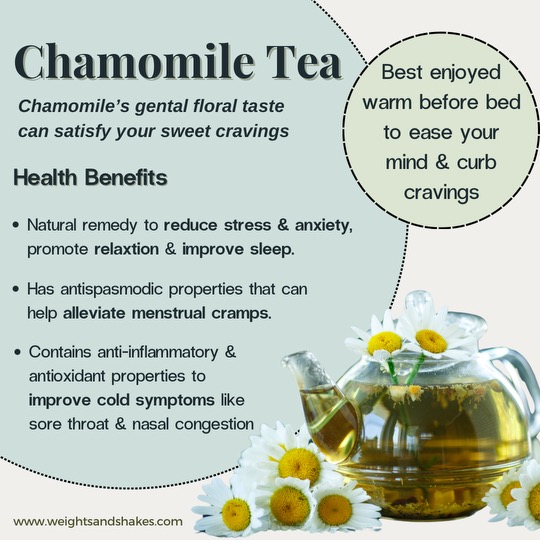 Chamomile tea has long been associated with its ability to relax the mind and body. Rich in antioxidants like apigenin, this calming tea is best known for its sleep-enhancing effects. Apigenin binds to certain receptors in your brain that may reduce insomnia and promote relaxation.
Chamomile tea has long been associated with its ability to relax the mind and body. Rich in antioxidants like apigenin, this calming tea is best known for its sleep-enhancing effects. Apigenin binds to certain receptors in your brain that may reduce insomnia and promote relaxation.
Sleep is crucial for recovery after a hard training session. Without enough rest, your muscles don’t have the time they need to repair and grow. Chamomile can aid in achieving deeper, more restorative sleep, which is essential for anyone looking to maximize their fitness results .
Chamomile is also anti-inflammatory, which can help reduce muscle soreness after an intense workout. So, if you’re looking for a tea to support recovery and stress management, chamomile is an ideal option.
Try it for better rest: FGO Organic Chamomile Tea.
Ginger Tea: Immunity Booster and Inflammation Fighter
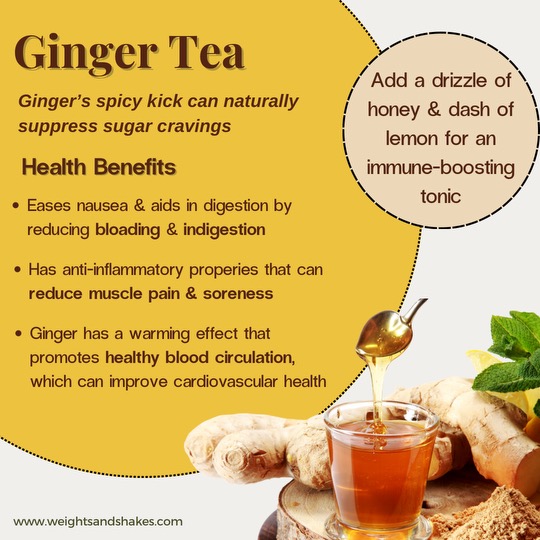 If you’re looking to add a little spice to your tea routine, ginger is the way to go. Ginger has been revered in both Ayurvedic and traditional Chinese medicine for its ability to combat nausea, reduce inflammation, and boost the immune system.
If you’re looking to add a little spice to your tea routine, ginger is the way to go. Ginger has been revered in both Ayurvedic and traditional Chinese medicine for its ability to combat nausea, reduce inflammation, and boost the immune system.
For athletes, ginger’s anti-inflammatory properties are key. Inflammation is a natural response to physical activity, but chronic inflammation can lead to injuries and burnout. Ginger tea can help reduce exercise-induced inflammation, making it a perfect post-workout drink to aid recovery.
Additionally, ginger’s natural ability to improve digestion and circulation means you’ll experience less post-exercise nausea and faster nutrient delivery throughout your body .
Spice up your recovery: Yogi Tea Ginger.
Hibiscus Tea: The Weight Management Wonder
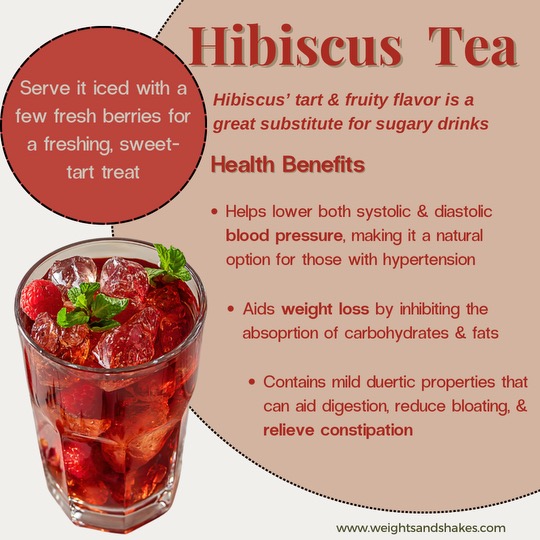 Hibiscus tea is not only beautifully vibrant but also packed with health benefits. Known for its tangy and slightly sweet flavor, hibiscus tea is loaded with antioxidants and has been shown to support heart health by lowering blood pressure and reducing cholesterol levels .
Hibiscus tea is not only beautifully vibrant but also packed with health benefits. Known for its tangy and slightly sweet flavor, hibiscus tea is loaded with antioxidants and has been shown to support heart health by lowering blood pressure and reducing cholesterol levels .
For those working on weight management or looking to shed body fat, hibiscus can be a game-changer. It helps regulate blood sugar levels, which can reduce cravings and prevent overeating. Its mild diuretic effect also helps eliminate excess fluids, which can be beneficial after a long workout session when you’re feeling a bit bloated.
Hibiscus tea is the perfect naturally sweet and tangy treat that supports both your fitness goals and your health.
Support heart health here: Traditional Medicinals Hibiscus Tea.
Rooibos Tea: Antioxidant-Packed and Caffeine-Free
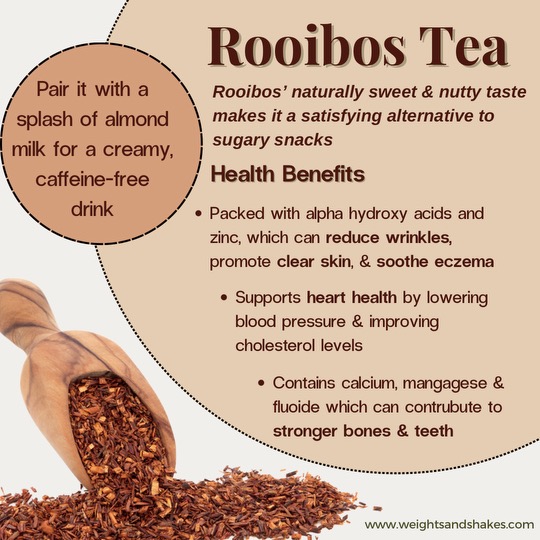 If you’re sensitive to caffeine but still want a healthful, sweet-tasting tea, rooibos is your answer. Rooibos is a South African herbal tea that is naturally caffeine-free and rich in antioxidants, which can help fight oxidative stress and improve skin health.
If you’re sensitive to caffeine but still want a healthful, sweet-tasting tea, rooibos is your answer. Rooibos is a South African herbal tea that is naturally caffeine-free and rich in antioxidants, which can help fight oxidative stress and improve skin health.
For fitness enthusiasts, rooibos tea can support recovery and digestion without the jitters that caffeine sometimes brings. It’s also been shown to reduce inflammation, making it a great option for people looking to manage their overall wellness without disrupting their sleep cycle.
For antioxidant support: Red Rooibos Tea.
Teas That Sweeten Your Fitness Journey
Incorporating these teas into your daily routine can help curb sugar cravings while offering a host of health benefits that support your training, recovery, and overall wellness. Whether you need a digestive aid, a sleep enhancer, or an anti-inflammatory boost, each tea offers unique properties that will keep you on track with your fitness goals.
While Weights & Shakes doesn’t sell teas, we’re all about giving you the best tips to keep you strong and healthy! Click on the links provided to try these teas from Amazon, and elevate your tea game with a sweet, fitness-friendly twist.
Looking for a treat that aligns with your fitness goals? These five teas serve as the perfect sweet swap while delivering health perks that elevate both your mind and body.
References:
- 1. McKay, D. L., & Blumberg, J. B. (2006). A review of the bioactivity and potential health benefits of chamomile tea (Matricaria recutita L.). Phytotherapy Research, 20(7), 519-530.
- 2. Zick, S. M., Wright, B. D., Sen, A., & Arnedt, J. T. (2011). Preliminary examination of the efficacy and safety of a standardized chamomile extract for chronic primary insomnia: A randomized placebo-controlled pilot study. BMC Complementary and Alternative Medicine, 11(1), 78.
- 3. Al-Amin, Z. M., Thomson, M., Al-Qattan, K. K., Peltonen-Shalaby, R., & Ali, M. (2006). Anti-diabetic and hypolipidemic properties of ginger (Zingiber officinale) in streptozotocin-induced diabetic rats. British Journal of Nutrition, 96(4), 660-666.
- 4. Raudenbush, B., Corley, N., & Eppich, W. (2001). The effects of peppermint aroma on human performance. International Journal of Sport Psychology.
- 5. Ernst, E., & Pittler, M. H. (2000). Efficacy of peppermint oil in irritable bowel syndrome: A systematic review. Gut, 48(4), 527-533.
- 6. Black, C. D., Herring, M. P., Hurley, D. J., & O’Connor, P. J. (2010). Ginger (Zingiber officinale) reduces muscle pain caused by eccentric exercise. The Journal of Pain, 11(9), 894-903.
- 7. Hopkins, A. L., Lamm, M. G., Funk, J. L., & Ritenbaugh, C. (2013). Hibiscus sabdariffa L. in the treatment of hypertension and hyperlipidemia: A comprehensive review of animal and human studies. Fitoterapia, 85, 84-94.
- 8. Serban, M. C., Sahebkar, A., Ursoniu, S., & Andrica, F. (2015). Effect of sour tea (Hibiscus sabdariffa L.) on arterial hypertension: A systematic review and meta-analysis of randomized controlled trials. Journal of Hypertension, 33(6), 1119-1127.
- 9. Pantsi, W., Marnewick, J. L., Esterhuyse, A. J., Rautenbach, F., Venter, C., & van Rooyen, J. (2011). Rooibos (Aspalathus linearis) protects the heart against ischemia/reperfusion injury via activation of the PI3-kinase pathway. European Journal of Nutrition, 50(3), 157-167.
- 10. Joubert, E., & Schulz, H. (2006). Production and quality aspects of rooibos tea and related products. Journal of Applied Botany and Food Quality, 80(2), 138-144.
Related Articles
Health & Wellness, Uncategorized




